Tina Fey transforms her cult classic 'Mean Girls' into a pricey musical
Fey and her husband Jeff Richmond are attempting a $15m feat that turns out to be a lot harder than it may sound: taking a movie people love and transforming it into a Broadway musical people will pay much moolah to see
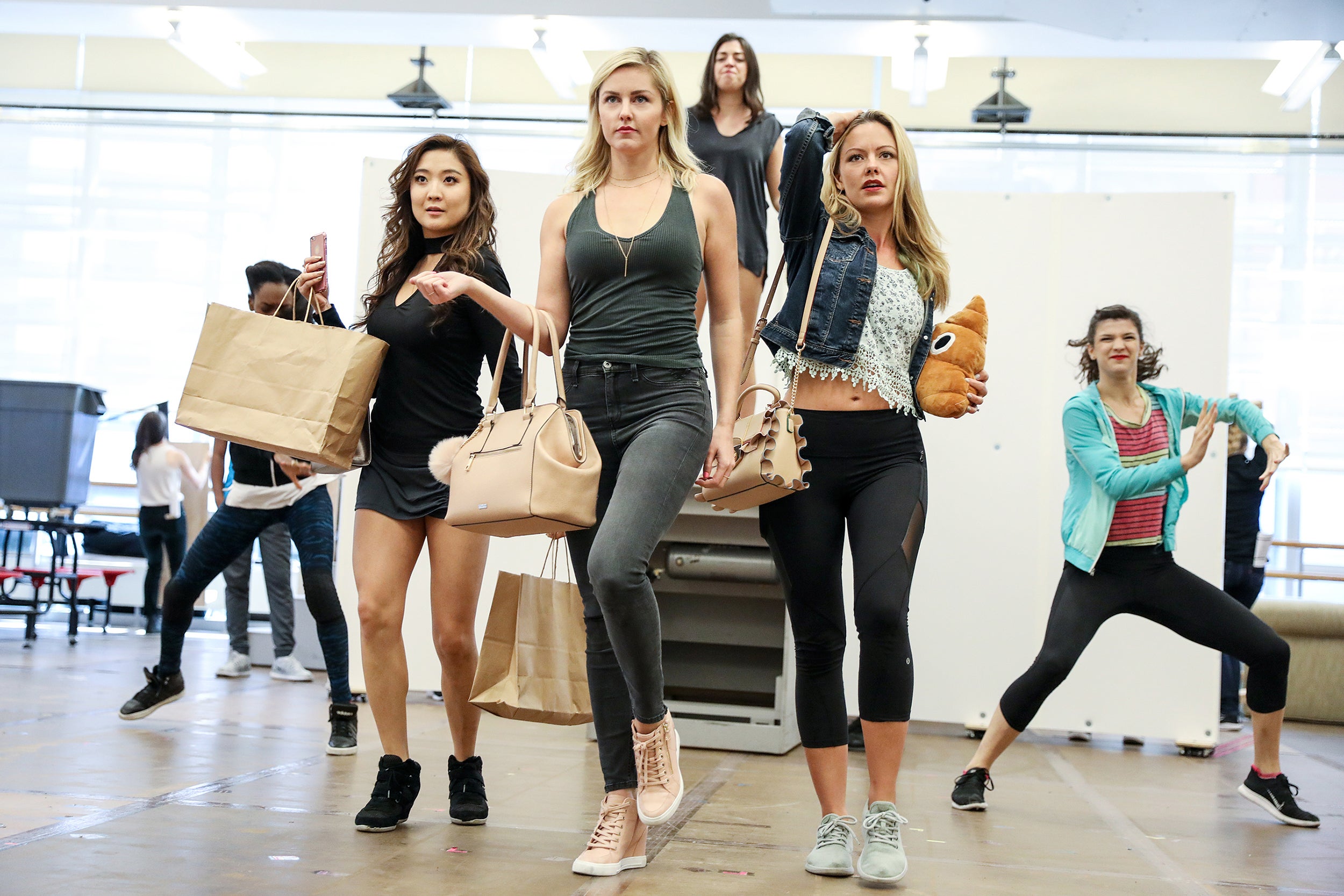
Your support helps us to tell the story
From reproductive rights to climate change to Big Tech, The Independent is on the ground when the story is developing. Whether it's investigating the financials of Elon Musk's pro-Trump PAC or producing our latest documentary, 'The A Word', which shines a light on the American women fighting for reproductive rights, we know how important it is to parse out the facts from the messaging.
At such a critical moment in US history, we need reporters on the ground. Your donation allows us to keep sending journalists to speak to both sides of the story.
The Independent is trusted by Americans across the entire political spectrum. And unlike many other quality news outlets, we choose not to lock Americans out of our reporting and analysis with paywalls. We believe quality journalism should be available to everyone, paid for by those who can afford it.
Your support makes all the difference.It is that time in the life of a new musical comedy when the dance numbers become sharper, the scene transitions smoother, the funny moments land more crisply. Actors are “off book” – that is, no longer using their scripts. Now, too, they wear costume pieces as they run longer stretches of the show, in a high-rise Manhattan rehearsal studio with an imaginary stage outlined in tape on the floor, makeshift props on the tables, and members of the creative team following along on their laptops.
At one of those computers sits one of the few people in the room who has never done anything like this before. Yes, live from New York, it’s Tina Fey, in her Broadway debut – or at this point, her pre-Broadway debut – as the writer of one of the buzzier projects of the season: a musical version of the only movie she’s ever written, the hit 2004 comedy Mean Girls.
For a sense of how theatregoers react and what might need to be fixed in the show – scheduled for an official Broadway opening in April – Mean Girls is relying on Washington audiences. The show’s tryout run at the National Theatre began previews on Tuesday and has its formal opening night on 19 November, when reviews will be posted. It’s the latest in a long line of musicals that have stuck their toes into capital waters before taking a New York dive, a tradition represented recently by the Tony Award-winning blockbuster, Dear Evan Hansen, born at Arena Stage, and Come From Away, a Broadway success that had a crucial early stop at Ford’s Theatre.
Along with her husband, Jeff Richmond, a longtime collaborator who composed the music, and Nell Benjamin (Legally Blonde: The Musical) who wrote the lyrics, Fey is attempting a feat that turns out to be a lot harder than it may sound: taking a movie people love and transforming it into a musical people will pay much moolah to see. Just ask the producers of the recently shuttered Groundhog Day, a $17m (£12.8m) Broadway flop, how tough this can be. Plus, it’s a jam-packed season for brand names in Broadway musicals: Disney’s Frozen, Jimmy Buffett’s Escape to Margaritaville, a SpongeBob SquarePants musical. And there’s no telling whether the fans who made Mean Girls an international sensation more than a decade ago will post positive comments online about this venture – or consign it to the fraying pages of their old high school Burn Books.
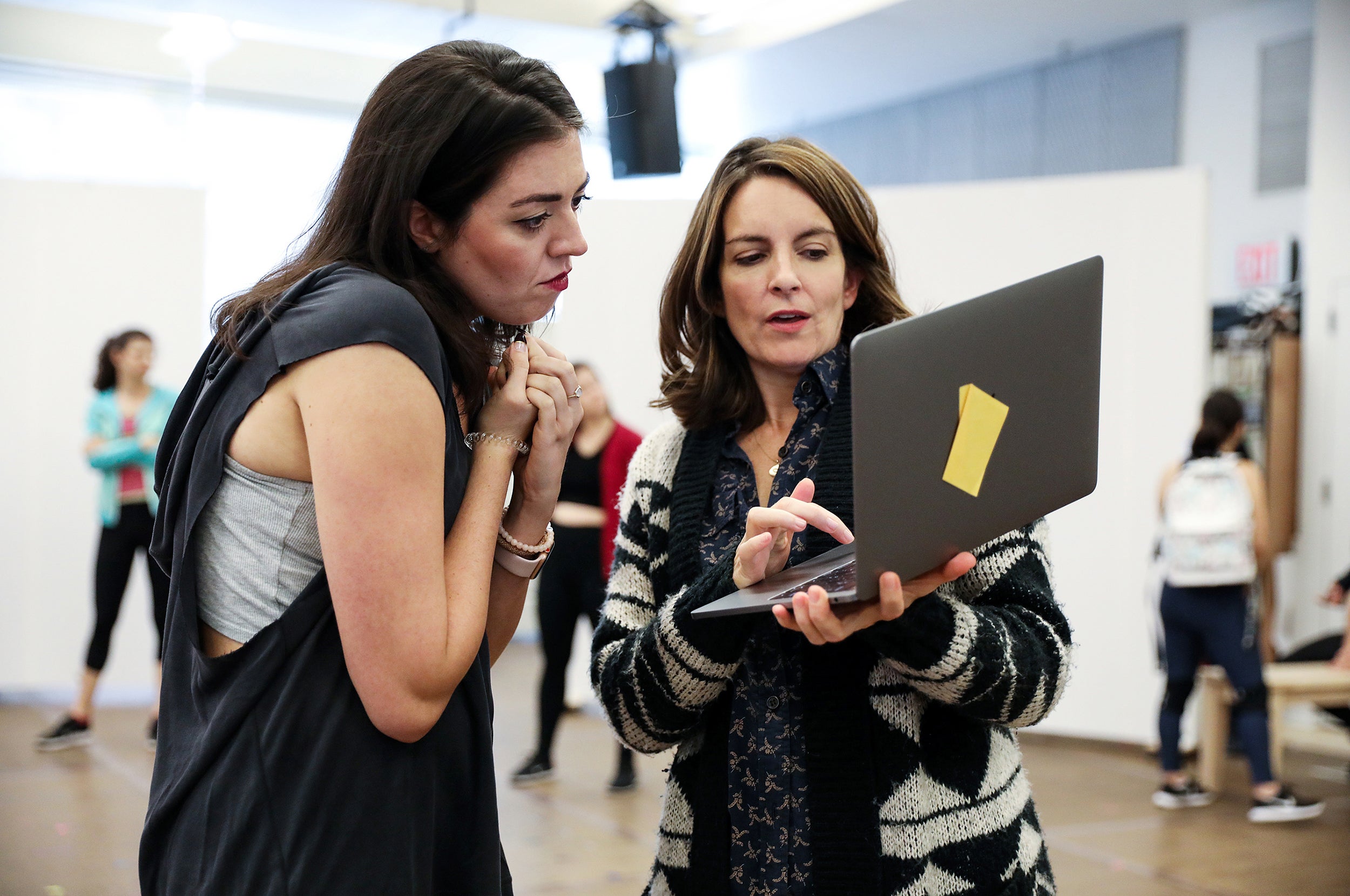
You don’t know what a Burn Book is?!? OMG, go watch the movie!
Like Dear Evan Hansen and Come From Away, Mean Girls enters the Broadway sweepstakes without a star. The show’s best-known player is Kerry Butler, who created the role of Penny Pingleton in the 2002 musical Hairspray and now plays the authority-figure characters assayed in the film by Fey and Amy Poehler. The young actresses who played the movie’s high school heroine and villain – Lindsay Lohan and Rachel McAdams – are succeeded here by Erika Henningsen as conscientious but eager-to-fit-in Cady Heron, and Taylor Louderman, as vindictive leader of the pack Regina George. The hope, of course, is that these teenage-character assignments could be the kind of career-defining turns that, say, Evan Hansen has been for Ben Platt.
Easily the best-known person attached to the project is Fey herself, a comedy dynamo who achieved fame on Saturday Night Live, went on to fill her shelves with Emmys for NBC’s 30 Rock and created, with Robert Carlock, the endearing Netflix sitcom gem The Unbreakable Kimmy Schmidt. Not that celebrity musical writers automatically cash in at the Broadway box office, either: Steve Martin and Edie Brickell learned this the hard way with last year’s short-lived Bright Star – yet another musical that tried out in Washington.
Still, Mean Girls has some promising things going for it, among them, wry source material with appeal for a younger market; a songwriting team that exhibits a natural affinity for Fey’s original script; and a director-choreographer, Casey Nicholaw, who, courtesy of his work on The Book of Mormon and Spamalot, has proved he knows how to stage songs that feed off the cleverness of premier comedy writers. In Fey, too, the production boasts the presence of a major talent who exhibits a level-headedness about an enterprise whose cost has been speculated to be in the neighbourhood of $15m. (The show won’t divulge its price tag.)
“At 47, I feel like I know what I know, I know what I don’t know, and the one thing I know that the four of us have that’s very strong, is work ethic,” Fey says of the creative team, during a lunch break. “And willingness to learn, and absence of rigidity. And all we can do is just keep working and checking and being vigilant and feel like we’re doing the best version we can. And the other stuff beyond that is kind of out of your control.”

It was the trust he had in Fey’s instincts that persuaded Lorne Michaels – the SNL producer and her mentor – to produce the Mean Girls movie. And it was Michaels to whom Fey turned when she and Richmond decided to pursue a musical version of the film. Over the years, Fey and Richmond heard about unauthorised stage adaptations of Mean Girls at colleges and such: “I never saw any of them, but I remember thinking like, ‘Hey man, you don’t have permission to do that!’,” Fey says. And with two girls of their own, now aged 12 and 6, they saw the commercial potential for this story on Broadway.
“It had solid characters and situations and timely issues,” Richmond says, sitting with Fey, Benjamin and Nicholaw in a small conference room next to the studio. “We have girls now, and I see where this kind of property would mean more than it did 10 years ago. At least in our world.”
‘I’ll go with her anywhere’
Michaels, whose Broadway producing credits were limited to solo comedy shows, by the late Gilda Radner and by another SNL alum, Colin Quinn, nevertheless signed on for one of the lead producing roles for Mean Girls. Because, well, Tina.
“Tina has as good and as tough an eye as anyone,” Michaels says, in a phone interview. “I’ll go with her anywhere. There is no one I have a higher regard for. Just on a level of intelligence, and heart.”
In the course of looking for a lyricist, Richmond and Fey met Benjamin for drinks; they liked the score she wrote with Laurence O’Keefe for Legally Blonde. And she was eager to work with them.
“I was just chanting, ‘Act normal, act normal’,” Benjamin says of the encounter.
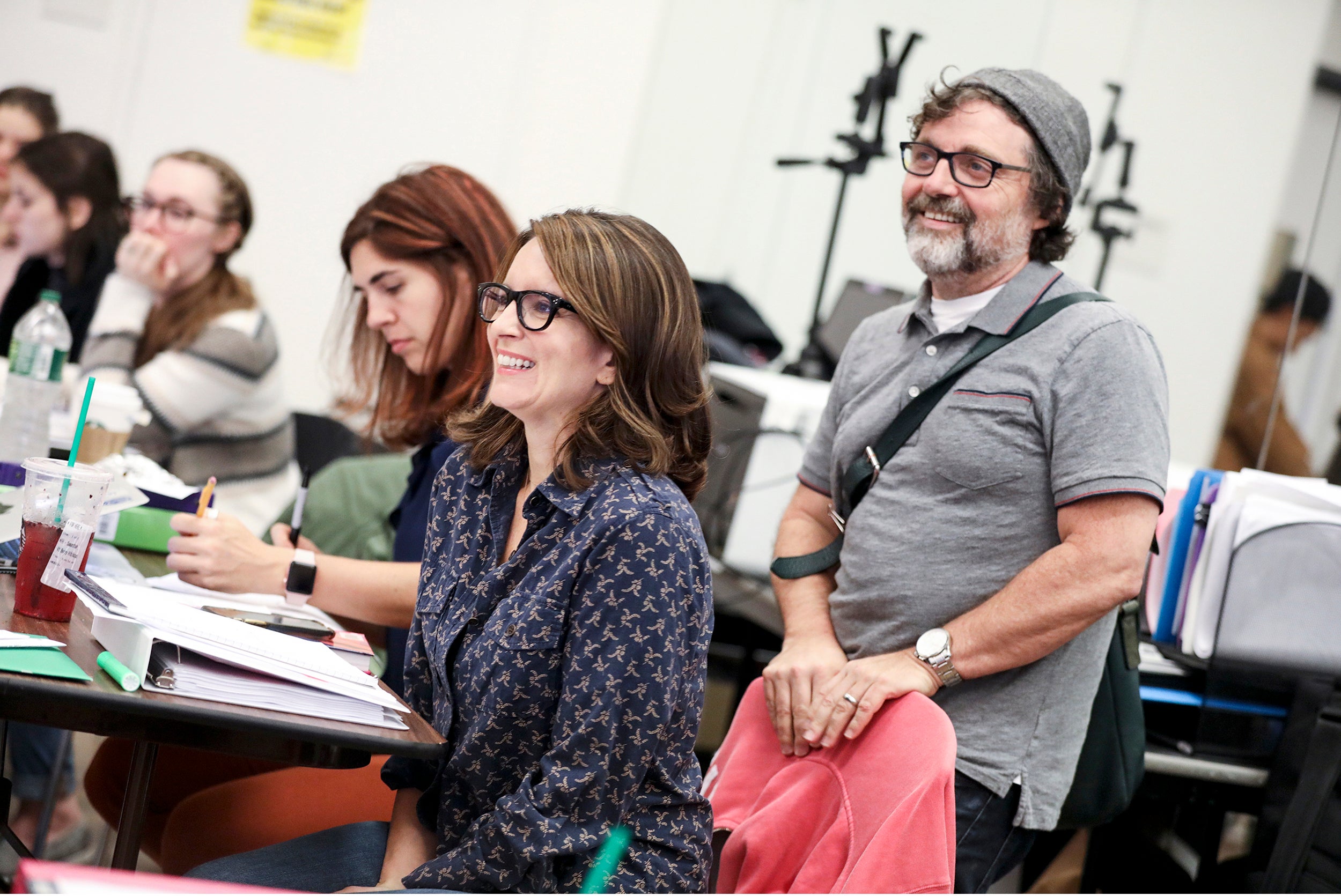
“We all just kind of hit it off and we were all seeing it the same way,” says Fey. As a matter of fact, they loved the song Benjamin submitted, “Stupid With Love”, so much that it made it into the finished product. “An important part of it was to take these characters seriously at their core,” Fey adds. “These are tiny struggles that they go through, right? They’re not Joan of Arc. But it’s not camp. It has to be taken seriously, from all their different points of view.”
The movie, with its dagger-sharp awareness of the tribal divisions of high school society – the cliques that dictate who’s in, who’s out, and who gets to sit with you at lunch – was several cuts above other flicks in the adolescent-comedy genre. Fey and Richmond’s older daughter watched it for the first time not too long ago. Fey remembers telling her, “I don’t want to show it to you early, not because it’s inappropriate – I just don’t want you to see it and not think it’s funny!” she recalls, laughing. “You know, I really want it to play!”
Inspired by Queen Bees and Wannabes, a 2002 nonfiction book by Rosalind Wiseman that explored the treacherous terrain of teenage pecking orders, Fey devised the story of Cady’s struggles in the suburban blackboard jungle after leaving the African savanna, where her parents worked and home-schooled her. With an attraction to an irresistible boy thrown in for good measure, Cady’s morality tale is classic devil-on-one-shoulder, angel-on-the-other, concerning whether Cady is going to fall in with Regina’s snarky set (who also include Ashley Park’s Gretchen and Kate Rockwell’s Karen) or stay true to misfits Janis and Damian, here played by Barrett Wilbert Weed and Grey Henson.
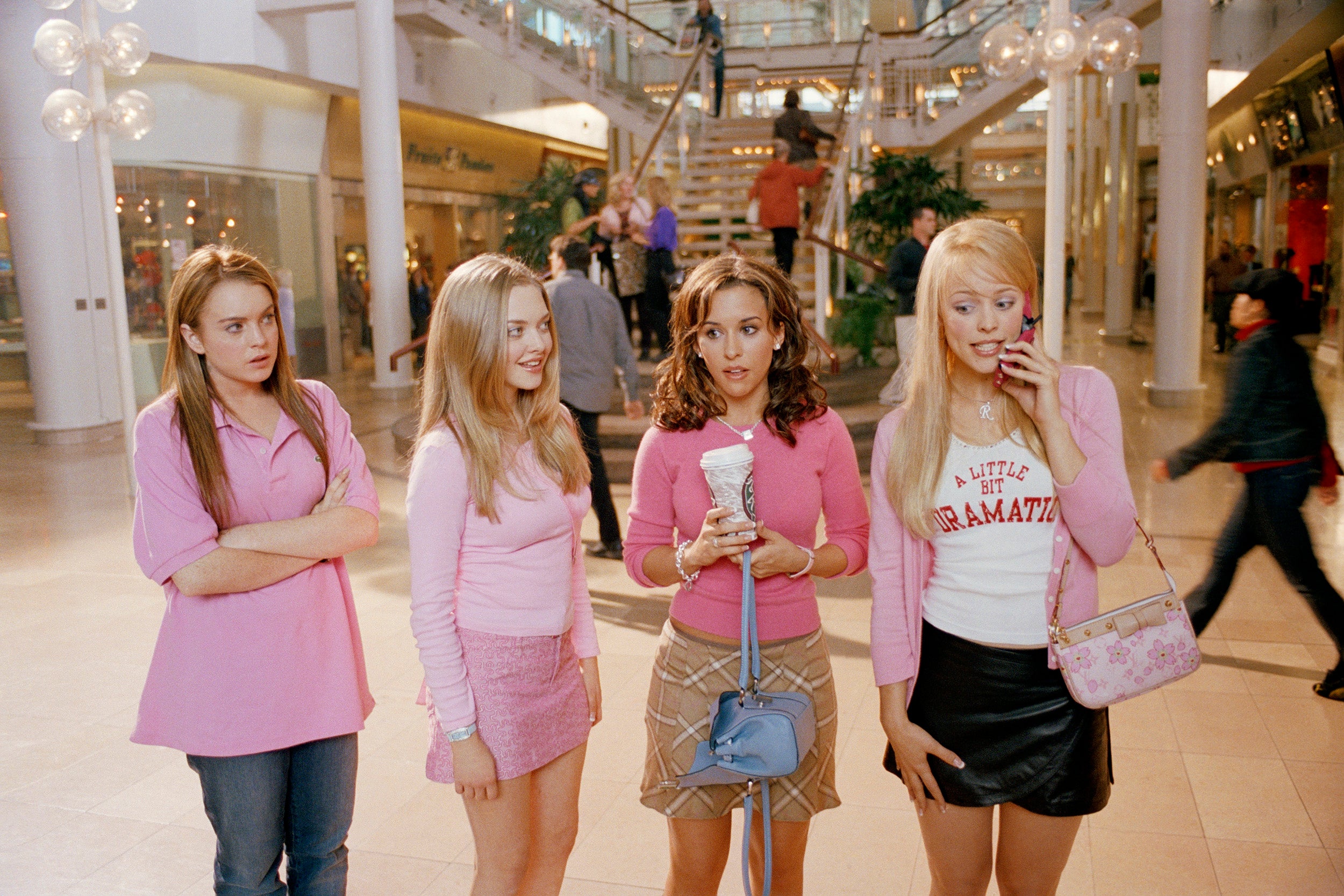
The stage version, with a pop score and an updating to the Snapchat world of 2017, remains faithful to the movie plot, which Fey says was an advantage in writing her first musical. “The nice thing about adaptation is you do know where you have to get to,” she says. Much debate occurred over which filmic moments an audience would expect to see onstage – or what, for example, might substitute for the commentary the characters delivered directly to the camera – although ultimately the work itself drove them to the answers. “If you’re entertaining people,” Nicholaw notes, “they’re not going to know until they go home what was in there and wasn’t there.”
The opening production number, “Wild Life”, which provides Cady’s backstory and the transition from Africa to America, includes some funny Broadway references and an introduction to the musical’s comic style.
“I wanted it to move with the fluidity of a really great improv show,” says Fey, who met Richmond when she was 24 and he was in his early 30s, and they were participating in something called the ImprovOlympic in Chicago.
“I feel like the book is so fun and so strong, that the songs are in support of that, and not shining above it,” Richmond says. “I really do believe that. It’s a really funny book.”
The playing’s the thing
Listening to her husband, Fey seems slightly embarrassed, the way a smart kid is when the teacher asks the class why everyone can’t be more like Tina. She gives him a wary look that says, “let’s take it down a notch”.
“From the button, we’ll continue into ‘Revenge Party’ you guys!’ ” Nicholaw announces on this early October day, as the ensemble of high school students (most of them actors in their 20s) prepares for the number. He’s running Act 2, trying to smooth the transitions, during which the actors roll the set pieces themselves into place. Nicholaw is going for a human-guided sensibility – no snazzy mechanisms to move scenery – that appears to an onlooker like a highly polished version of what the members of the high school drama club would be expected to do on performance night.
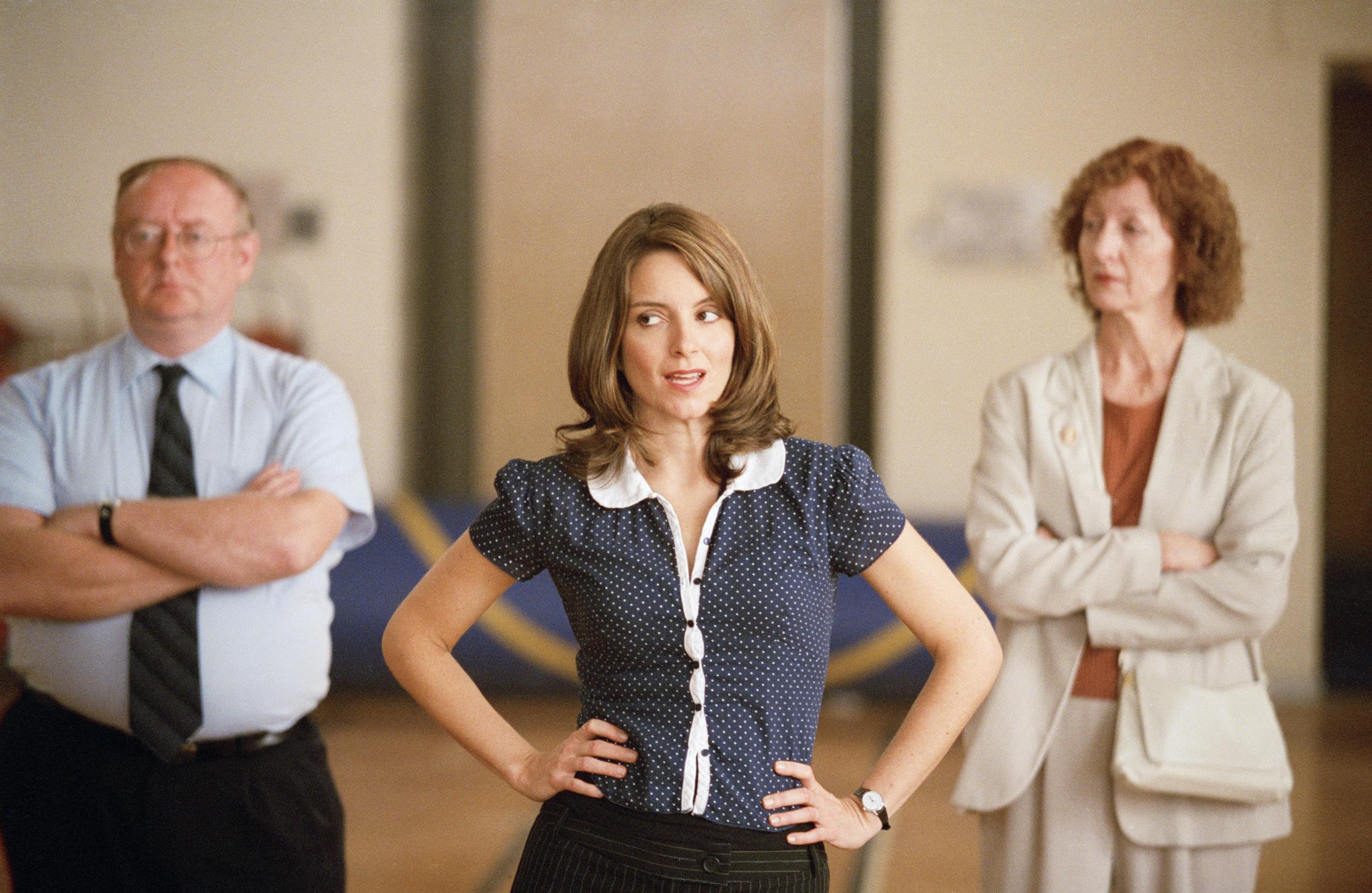
Benjamin is perched by the piano and Richmond is seated a few chairs away from Fey, who is now watching a scene in which Regina, having been tricked by Cady into eating high-calorie “nutrition” bars, is seen to have put on weight. Louderman has not yet been padded, and so when she bends over, she’s still her trim self.
Concerned, Fey turns around to face a visitor. She spreads her hands wide, conjuring in the air an enormous backside – just to make sure you fully appreciate the joke-in-progress. You smile, and she’s pleased.
And of course, she would be. Because Tina Fey always, always, wants it to play.
© Washington Post
Join our commenting forum
Join thought-provoking conversations, follow other Independent readers and see their replies
Comments